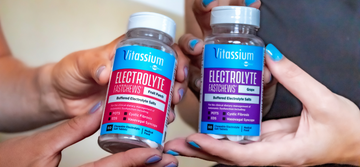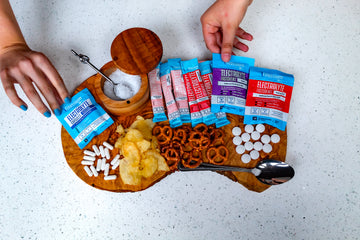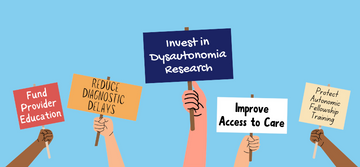
Patients within the dysautonomia community often run into the term “salt wasting.” Read on to discover the symptoms, possible causes and treatments for this condition.
What is salt wasting?
Salt wasting—also known as “cerebral salt wasting” (CSW) or “renal salt wasting” (RSW)—is a condition in which the body’s ability to absorb and reabsorb sodium is inhibited. It is sometimes confused with inappropriate secretion of antidiuretic hormone (SIADH), which is a condition with similar symptoms but a different physiology. The tell-tale difference is that CSW is accompanied by high sodium levels in urine and low blood volume, while SIADH is associated with normal to high blood volume.
Physical symptoms of CSW include high urine output, excessive thirst and extreme salt cravings. These symptoms are the result of the body attempting to replace what is being inappropriately lost, and people experiencing CSW often can alleviate their symptoms by consuming high amounts of salt and water. More extreme symptoms include lightheadedness, fainting, headache, nausea and even loss of consciousness—similar to the symptoms experienced by patients with dysautonomia.
Who is at risk for salt wasting?
CSW is most commonly seen in patients suffering from a head injury, such as a concussion or invasive surgery. However, some patients display symptoms of CSW without any change to the brain or nervous system.
Additionally, not all patients with dysautonomia show signs of salt wasting, and not all patients who show signs of salt wasting have dysautonomia. The two are correlated, but one does not cause the other.
What causes salt wasting?
While no one knows the exact cause of salt wasting, there are two dominant theories.
Disrupted neural input to the kidneys. Salt wasting is often associated with CNS conditions, or diseases that affect the brain and nervous system. Thus, the theory goes, the neural impulses required by the kidneys to work efficiently are depressed, which results in inefficient reabsorption of sodium into the bloodstream. CNS conditions are also believed to interrupt the hormonal systems governing electrolyte balance, which further slows down sodium retention.
High levels of natriuretic peptides. Natriuretic peptides are proteins that help regulate blood pressure by inducing the kidneys to flush sodium from the bloodstream through urination. In patients suffering from CSW, doctors often observe inappropriately high levels of these peptides. Although the reason is unknown, high levels of natriuretic peptides cause excessive sodium excretion, leading to salt wasting.
What can I do about salt wasting?
CSW is characterized by low blood volume, which can be helped by drinking lots of water and consuming high amounts of electrolytes, particularly sodium. In fact, some treatment protocols call for up to 12 grams of salt per day. Given everybody is different, it’s best to work with a doctor to determine your individual hydration plan.
If you’re struggling to get enough sodium into your diet through salty foods, you may find supplements like SaltStick® Vitassium® can make things easier by providing concentrated forms of sodium in a form that is easily absorbed by your body without leading to stomach upset. Vitassium is a medical food specifically formulated to provide sodium and potassium for the clinical dietary management for patients with autonomic dysfunction including Postural Orthostatic Tachycardia Syndrome (POTS), Ehlers Danlos Syndrome (EDS), Cystic Fibrosis (CF) and Vasovagal Syncope, when increased plasma volume has been shown to be beneficial, so that you can Get Your Life Back®. Each two-capsule serving contains 500 mg of sodium (22 mmol sodium, 1270 mg sodium chloride) and 100 mg of potassium.
If you live in the U.S. and you want to learn more about Vitassium, consider the SaltStick Vitassium Club. It’s free to join, and as a member, you’ll get access to 20% discounts on all our products, along with free shipping on orders worth $75 or more. Learn more about the Vitassium Club here.
Disclaimer: Contact your physician before starting any exercise program or if you are taking any medication. Individuals with high blood pressure should also consult their physician prior to taking an electrolyte supplement. Overdose of electrolytes is possible, with symptoms such as vomiting and feeling ill, and care should be taken not to overdose on any electrolyte supplement.







